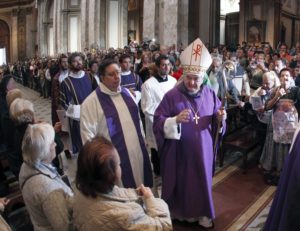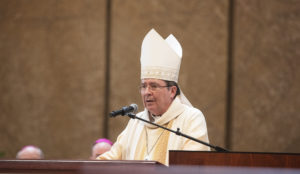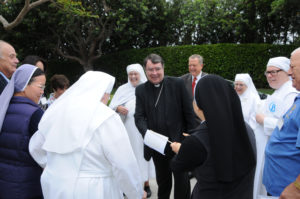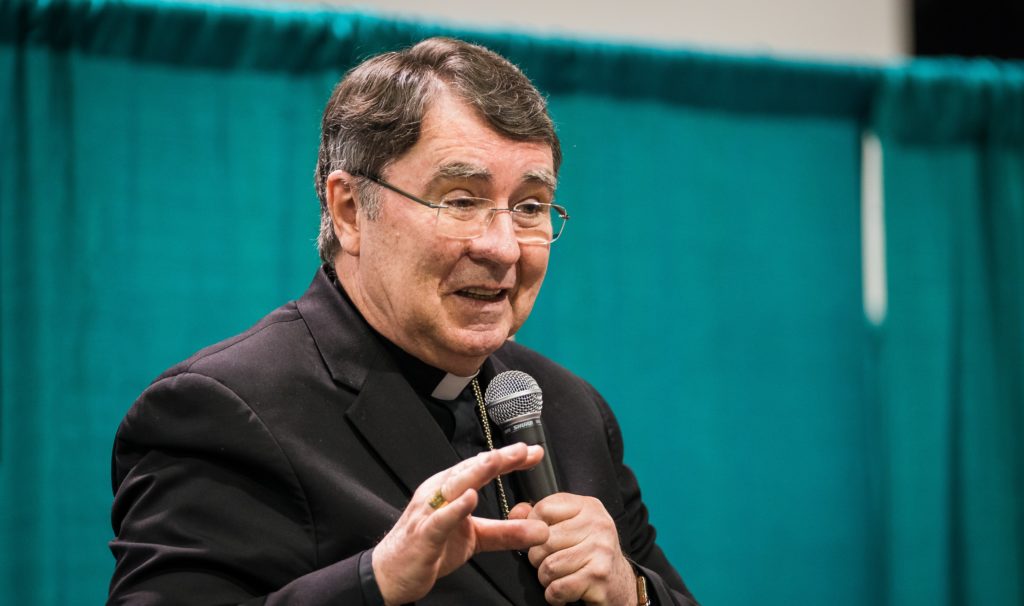For most American Catholics, perhaps the only familiar name among Pope Francis’ latest round of picks for new cardinals is that of Archbishop Christophe Pierre, apostolic nuncio to the U.S. since 2016.
But the nomination of the 77-year-old French diplomat was a bit of a surprise. Typically, bishops of large, well-known dioceses or Vatican officials in important posts rank higher than papal ambassadors when it comes to deciding who gets a cardinal’s red hat.
Before coming to Washington, Pierre served as nuncio in Uganda, Haiti, and Mexico. In the U.S., he has overseen the selection process for a generation of new bishops, helped navigate the tricky politics involving two presidential administrations, and coordinated the implementation of the Vatican’s new policy for investigating bishops accused of abuse or cover-up amid the resurgence of the clerical abuse crisis.
A few days after the announcement, Cardinal-designate Pierre took questions via Zoom on a range of topics including his reaction to the surprise news, perception problems between American Catholics and the pope, and the side of late Auxiliary Bishop David O’Connell that he didn’t know. The conversation has been edited for length.
Archbishop, your job involves delivering surprising news, like telling priests that the pope has nominated them to become bishops. What was it like to be on the other end of the news this time?
I was still half asleep when I got the call on that Sunday morning. It was a big surprise, of course; I was not expecting that.
When I call a priest to tell him that the Holy Father has appointed him a bishop, I am quite anxious because I always want him to say yes. This is a bit different because I heard I was already appointed. The news is already out there, so there is no point in saying no.
It’s a great responsibility, and the trust of the Holy Father in my own person is important. We’ll see how he wants us [cardinals-elect] to help him. It is an honor, of course, but also quite a responsibility. I feel that.
At that time, I remembered the sentence of Jesus to Peter: Do you love me? Do you really love me more? I think it’s a question of love. I love the Church, I really like the pope. I’ve always tried to be a faithful servant of the pope. But I also feel that this is asking me to serve more, in all senses of the term.

Any interesting personal connections to any of the other cardinals-elect?
Yes! Some of them I actually know quite well. There is another nuncio on the list who’s still active, Archbishop Emil Paul Tscherrig, the nuncio in Italy. We were together in diplomatic school in Rome for a while, even though he was one year after me. So I’m quite happy not to be alone, to have a colleague with me (laughs). We are good friends.
There is also Archbishop [Agostino] Marchetto. He was also a nuncio, and we were together for a few years serving the same nuncio when I was working in Zimbabwe and he was in Mozambique. So we worked together and we are also good friends.
So it’s interesting. I would have never thought I would be made a cardinal with them!
Your time as nuncio has been marked by a few challenging realities, like the reawakening of this country’s clerical sex abuse crisis, declines in church participation and church closures in parts of the country, the COVID-19 pandemic, and two presidential elections. Have you kept a single top priority on your mind through it all?
My main, personal concern is to accompany the work of evangelization in this country.
We, the Church, are in the society in order to announce the good news of the gospel. This is the main concern of the Holy Father. This is why all his documents speak about the invitation of Christ to all of us to become disciples and make disciples, and to announce the good news.
For that, we need to go out of our comfort zone, to go to the peripheries. This is the language of the Holy Father that I’ve personally tried to communicate in my interventions and my conversations, to help the local church be attuned to the message of the Holy Father.
This is what the Catholic Church is about. The Church is not just a connection of small churches. It’s one big church but one that is incarnated, inculturated in various circumstances and cultures. Part of my concern — and that of the pope — is to evangelize the people where they are, and as they are, taking into account the particularities but never forgetting the unity of the Church.
This society is very polarized. The Church needs to help society and work for unity, not in an artificial way but to help people add new dimensions. If the Church is polarized like the society, of what use is the Church?

Last month, speaking to the U.S. bishops at their spring meeting in Orlando, you remembered late Auxiliary Bishop David G. O’Connell as “a model of synodal service.” You were here for the LA Religious Education Congress just a few days after his death. Did you learn anything new about him during that visit?
I knew Bishop David, I had met him a few times, I liked him as a human being, he was a very nice person, and I always appreciated him. But let’s be honest: I did not know him well.
I just happened to be in LA for Congress during those days, and I accompanied Archbishop Gomez, who was, as you know, quite sad at the time. But being with him and encountering the thousands of people at the Congress, I was quite amazed to hear the witness of the people about [O’Connell’s] life.
I discovered the bishop there: how this man had been close to people and had been a true witness. He was loved by the people, but he didn’t make much noise.
His death was very tragic, a bit absurd. But I personally consider him a martyr, because he finished his life the way he had lived it: It was a life given. And for me, this is a wonderful example.
Why did I speak about him and synodality? Precisely because in this country today — and in this Church — a lot of people say that they don’t understand synodality. Some are resistant. What does the pope want when he speaks about synodality? It’s about getting people to work together. And you know, in his own way, [Bishop O’Connell] was close to the people but he was always trying to help them gather together, pray together, serving them. This is a synodal way. A kind of model. This is what the Holy Father means.
Once we have met Christ, we enter into his body, which is the Church. And the Church will be the place where the witness of Christ will be manifested to the people.
As a priest and as a bishop, David was really a wonderful instrument of encounter with the people. That was the purpose of his life. In a way, he was quite modest. He was a good auxiliary, not making noise — but that’s the real noise I like. (laughs)
Speaking of synodality and misunderstandings, there’s a perception among some Catholics that Pope Francis doesn't understand Americans. Then there are others who say that Americans just don't understand the pope. Based on your experience, is there any truth to either of those statements?
Well, these are certainly perceptions. So, if there are these perceptions, I think we have a responsibility to find out what’s behind them. I see that there is something much deeper behind them, perhaps a kind of misunderstanding as we prepare for the synod gathering in October and the one next year.
Maybe we think preparing a synod is just expressing a few ideas about the reform of the Church and to write them down on a piece of paper and to send it to the dioceses, the bishops’ conferences, at the continental level, and to Rome. And then, once we have done the job, we say, OK, we’ve done it. But this is only one thing.
But what we have to understand — and I think there’s been a lack of understanding from many quarters — is that the Synod on Synodality is supposed to reflect upon the experience that we’ve had at the local level. This is the reason why it is called Synod on Synodality. It’s a synod to reflect on how we could work together.
The pope said it very clearly when he launched the synod. He invited all the churches all over the world, at all levels, to begin this process of listening to one another, of trying to discern the best way to evangelize at our level. And then to give the results of this reflection so that at the level of the whole universal Church we may have some indications.
But the purpose of it is to work together. So for me, synodality is not the end of the process. This is the reason why the pope said that the Church will be synodal or it will not be the Church. Because a church where everybody is not involved is not the Church. It’s not just the Church of the parish priest or the bishop, or of a small group of people.
It seems that there’s been a misunderstanding, and many people have a kind of fear that the Church will be destroyed or that doctrine will be changed because of synodality.
It’s not true. The pope said it many times: What I want is to have a real revolution at the level of evangelization, because the world is different. And we know that it’s difficult today to reach out to people, many people don’t go to church, parents have difficulty teaching the faith to their children. The teachers don’t communicate with their students, and even the priests! So there is a problem in society today, which is a cultural problem.
What I proposed [in Orlando] is that we listen together and try to rebuild the Church so that it may correspond to the necessities of the time and evangelize the people of today.

Last April, you gave a talk at the Catholic University of America spelling out some thoughts on the National Eucharistic Revival. How do you think Americans can best take advantage of this initiative?
I think it’s wonderful that the U.S. bishops have launched the whole Church in this kind of adventure. They’ve done it because they felt that a lot of people today may have forgotten about what the Eucharist is. And I think this comes from a lack of religious education. I think there’s a big crisis. Also with the COVID pandemic and the secularization of society.
So, the bishops said, we have to do something, and I think this Eucharistic Revival is very important and that many fruits will come out of it.
But on the other hand, as I said in my intervention, we need to also take the opportunity to discover all the dimensions of the Eucharist, to make a real catechesis. I think there is a kind of focalization on adoration and processions. And this is part of the tradition of the Church and I’m sure that many — especially young people — will have a personal encounter with Christ through these things. I’ve experienced it myself during my life and I think it’s extremely important.
What’s important is the encounter with Christ in order to become the body of Christ as a Church, which is the purpose of the Eucharist. It’s what happened in the first Eucharist, which Jesus celebrated with his disciples after three years of preparation.
Before dying and offering his life as a sacrifice to redeem us, Jesus had this Paschal meal, during which he said “now I’m going to die out of love for you, to redeem you from your sins. But for that, remember what you are living now.” He took the bread and said “take it, this is my body, my blood…”
That day, the disciples became the body of Christ. They are assimilated. That’s what holy Communion is. They assimilated Christ, they became part of him!
So I think it’s important that the Eucharistic Revival helps people to realize that, because the consequences will be big, if we are the body of Christ, if we are Christ in the middle of society. We will be able to become witnesses of his presence and transform the reality.
Pope Francis has named you a cardinal at 77 years old, two years past the standard retirement age for bishops. Did the pope just mess up your retirement plans?
Well, I have no retirement plans!
When I was 75, the pope told me no [to retiring]. So, I’m still there. I may stay for a while. But I’m quite open. Once it’s finished, it’s finished, and we shall see. Then I will see what to do, but it’s OK. I have no other plan than to do what I’m asked to do. This is the beauty of the life of a priest: You are free.

